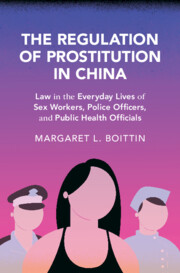 The Regulation of Prostitution in China
The Regulation of Prostitution in China Book contents
- The Regulation of Prostitution in China
- Cambridge Studies in Law and Society
- The Regulation of Prostitution in China
- Copyright page
- Dedication
- Contents
- Acknowledgments
- 1 Introduction
- Part I History, Contemporary Context, and Official Policies
- Part II Society
- Part III The State
- 8 Patterns of Punishment
- 9 The Weak Yet Savvy Street-Level Police Officer
- 10 China’s Sex Worker Health Policies: The Influence of Transnational Actors and Their Limitations
- 11 Street-Level Health Officials
- 12 Conclusion
- Book part
- Bibliography
- Index
- Cambridge Studies in Law and Society
10 - China’s Sex Worker Health Policies: The Influence of Transnational Actors and Their Limitations
from Part III - The State
Published online by Cambridge University Press: 05 December 2024
- The Regulation of Prostitution in China
- Cambridge Studies in Law and Society
- The Regulation of Prostitution in China
- Copyright page
- Dedication
- Contents
- Acknowledgments
- 1 Introduction
- Part I History, Contemporary Context, and Official Policies
- Part II Society
- Part III The State
- 8 Patterns of Punishment
- 9 The Weak Yet Savvy Street-Level Police Officer
- 10 China’s Sex Worker Health Policies: The Influence of Transnational Actors and Their Limitations
- 11 Street-Level Health Officials
- 12 Conclusion
- Book part
- Bibliography
- Index
- Cambridge Studies in Law and Society
Summary
This chapter is about the influence of transnational actors on China’s sex worker health policies. While the policing of prostitution in China is a story of domestic law and politics, the public health approach to regulating sex work in China starts in the international global health community. It then makes its way into central government health institutions in Beijing, and trickles down into the lives of local state health workers and the sex workers in their community. These transnational roots matter: they have shaped both the content of sex work health policies and the public health officials who manage their administration. Indeed, the approach that China’s health policies and officials endorse for gauging the prevalence of HIV/AIDS and reducing its occurrence among sex workers, and the language these authorities use, reflect best practices in the global public health community. Yet the obstacles that Chinese health agents encounter result in practices that fall short of these ideals and harm sex workers. That often grim reality is the subject of the next chapter. What I highlight in this chapter is how the global public health community working in China to support the creation of HIV/AIDS policies seems disengaged from what actually happens on the ground.
Keywords
- Type
- Chapter
- Information
- The Regulation of Prostitution in ChinaLaw in the Everyday Lives of Sex Workers, Police Officers, and Public Health Officials, pp. 256 - 271Publisher: Cambridge University PressPrint publication year: 2024
